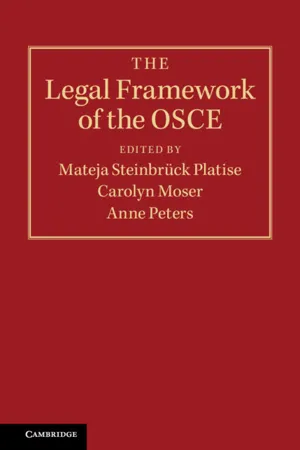
- English
- PDF
- Available on iOS & Android
The Legal Framework of the OSCE
About this book
The Organization for Security and Cooperation in Europe (OSCE), the world's largest regional security organisation, possesses most of the attributes traditionally ascribed to an international organisation, but lacks a constitutive treaty and an established international legal personality. Moreover, OSCE decisions are considered mere political commitments and thus not legally binding. As such, it seems to correspond to the general zeitgeist, in which new, less formal actors and forms of international cooperation gain prominence, while traditional actors and instruments of international law are in stagnation. However, an increasing number of voices - including the OSCE participating states - have been advocating for more formal and autonomous OSCE institutional structures, for international legal personality, or even for the adoption of a constitutive treaty. The book analyses why and how these demands have emerged, critically analyses the reform proposals and provides new arguments for revisiting the OSCE legal framework.
Frequently asked questions
- Essential is ideal for learners and professionals who enjoy exploring a wide range of subjects. Access the Essential Library with 800,000+ trusted titles and best-sellers across business, personal growth, and the humanities. Includes unlimited reading time and Standard Read Aloud voice.
- Complete: Perfect for advanced learners and researchers needing full, unrestricted access. Unlock 1.4M+ books across hundreds of subjects, including academic and specialized titles. The Complete Plan also includes advanced features like Premium Read Aloud and Research Assistant.
Please note we cannot support devices running on iOS 13 and Android 7 or earlier. Learn more about using the app.
Information
Table of contents
- Cover
- Half-title page
- Title page
- Copyright page
- Contents
- List of Contributors
- Preface
- List of Abbreviations
- Part I Introduction
- Part II The Quest for International Legal Personality
- Part III Manifestations of the Legal Position under International Law
- Part IV The Legal and Institutional Framework as a Governance Issue
- Part V Conclusions
- Index